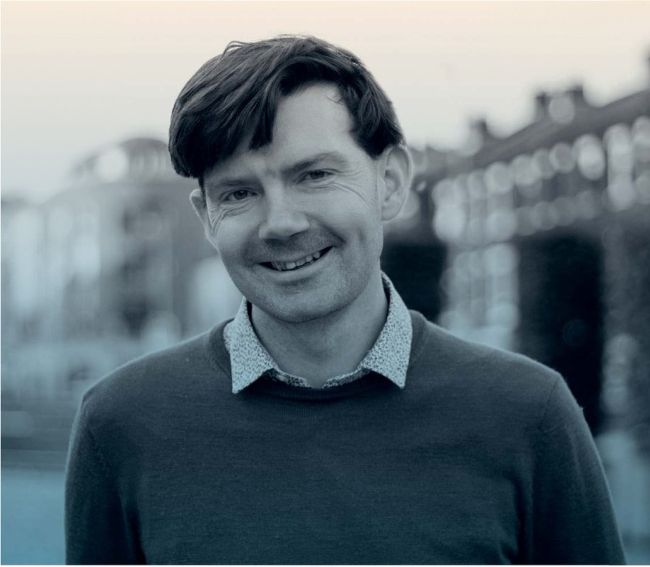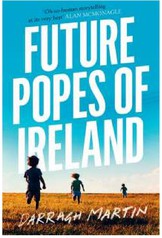The Good Book
It’s the day before Pope Francis hits Dublin for his contentious visit and in an almost blessed piece of timing, Darragh Martin is doing the press junket for his new novel Future Popes Of Ireland. He talks to Peter Dunne about inspirations, dark comedy and the place for religion in a country slowing losing its own.
The story of a family, a nation, and the heavy influence of the Catholic Church on both, Darragh Martin’s Future Popes of Ireland has been impressively likened to Jonathan Franzen’s The Corrections for its similar delving into fractured familial relationships. It’s ambitious in scope, beginning with Pope John Paul’s 1979 visit to a vastly different Ireland and spanning the proceeding 30 years of a country left struggling in his wake. Momentous events are wall-to-wall; the beginning of the gay rights movement, the litany of women forced to travel abroad for abortions, the Shell pipeline, even the recession. With such weighty themes, it’s a good thing there’s a broad streak of Irish humour running throughout.

So how did Darragh himself begin on the road to writing a novel about the journey Ireland took? “I grew up in North Dublin in Raheny,” he begins. “I was a big reader as a kid so started writing fantasy stories, then wanted to be a journalist. did work experience with a newspaper and thought maybe preferred making stuff up.”
Darragh wrote a novel for children in 2015, The Keeper, but Future Popes is his first foray into, for want of a better phrase, adult books.
“I had worked in theatre doing plays but hadn’t written stuff for adults before,” he says. “I hadn’t really planned to write a novel. was on a writing retreat in the woods trying to write a play and it was going really horribly. wanted to write about the global financial crash based on a Shakespeare play and it just wasn’t working.”
Even though the play’s creation stuttered, a novel began to take form. “It started with the idea of the Pope’s visit. was born the year after. In school, there were a few people called John Paul, and they were often far from who you would imagine could be pope. loved that gap between the world they had been brought into and the expectations on them, and how they were living their lives. Then had this idea of this Irish granny who wanted to have the first Irish pope and how she ended up with three kids, none of whom were papal material.”

Similar to his play about the financial crash, Darragh wanted to keep that unflinching look at a country’s struggle. “I wanted to write about how we moved from the Catholic Ireland was born into and left, to the Celtic Tiger crash. When was at university, was involved in politics, so wanted characters involved in that. wanted it to be about abortion, wanted it to be about gay rights; knew wanted it to be a bit about climate change. Then the characters start to build their own lives, so one plotline follows Damien who works with the Green Party, or Rosie who grows to be an activist, or Peg who has to leave Ireland because she is pregnant.”
One of the most intriguing characters is Damien, the gay brother who is at first the most devout, even as his faith condemns his homosexuality. Could there be a correlation between Damien and Darragh himself, a gay man who as a teenager was a secretary in the Kilbarrack Legion of Mary branch?
He mulls this over for a moment, holding his coffee cup with varnished nails that may have raised an eyebrow back in the Legion days. “I suppose in some respects, yes. Where Damien’s world and mine intersect is that when was a teenager was quite Catholic for a while.”
Did his sexuality clash with his faith then? “In some sense, yes. don’t know if was ever that clear. It’s not like had one moment where went, ‘Now I’ve come out!’ For me it was much more gradual, it was a slow erosion of Catholicism and religion, with being openly gay. wouldn’t say either of them happened simultaneously but of course they’re connected.”
For a gay creative, is there ever an expectation to create gaythemed work with gay characters? “I don’t feel obliged, but really want to,” says Darragh. “Part of the reason wanted to be a writer is to think about the world we have and how representational it is. feel that’s changing actually, which is great. wanted to have a wider frame of queer stories. wanted to have more than one gay story. really wanted to have the Rory character, who’s out as a teenager and really owning that, and Mark who has different politics to Damien about being queer, and Mary (an aunt who has to keep her lesbianism from the family) with her story of being out in the ‘80s.
“One of the things that was interesting in researching the political stuff at the time is that in the ‘80s the campaign against the eighth amendment was really tied in with gay rights activism, so a lot of what the church was repressing was about the body. think that’s so connected.”
The sibling who has gone unmentioned so far is the one who provides the novel with its title – John Paul, the apple of Granny Doyle’s eye and her future hopeful nomination for the papacy, is a much-beloved child who eventually revolts. He becomes the exact opposite of what his grandmother wanted – a Youtube-style practical joker who conducts tongue-in-cheek ‘miracles’, making a mockery of Catholicism. Was John Paul a rebuke against the faith Darragh once held in such high regard?
“Certainly the Catholic religion was so damaging in Ireland. I think with John Paul, was interested in kind of a chancer character who says he’s a good Catholic but doesn’t really believe in God. He wouldn’t see it as a rebuke; he’d see it as a bit of fun. There’s quite a strain of ironic appreciation of the Catholicism of those days, like ‘wasn’t it ridiculous?’, but think certainly within that there’s a bit of fondness to it.”
Sitting as we are in the apparent calm before the papal storm, unsure just how big, or small, the reaction to the pontiff’s visit will be, is it just serendipitous that the book begins with one pope’s visit and its release coincides with another one coming?
“Honestly you couldn’t have asked for better timing,” Darragh laughs. “Not just the Pope’s visit, but two referendums – gay marriage and repeal – they’re obviously big plot lines. It’s been really wonderful actually to have seen those shifts happen, even while I’ve been writing the book. In terms of the Pope coming now, there’s a lot about how we’ve changed. The book is asking that question from different angles.”
Was there ever a worry that there might be a negative backlash to the novel’s look at religion from a country still trying to break ties with Catholic institutions?
“There might still be. In some ways, the book is very critical of the problems of Catholic Ireland, but also feel very secure in what I’m saying and who am. It feels quite a personal project for me, even though it’s not about my life. It’s introspective of the world grew up in.”
Early reviews are in and those fears may prove to be unfounded. Darragh seems pleasantly stunned by it all. “It’s been amazing actually, the reviews this weekend were lovely and it’s really nice to see it resonating with people. When started this was thinking maybe should write another kid’s book and try and build a career for myself doing that. It was like everything was telling me not to do it, but was like, have a story, it’s in my head and I’ve got to get it out.”
And that he has. The interview comes to a close, Darragh is heading to RTÉ next, his car sure to drive past the barriers being laid out in preparation for Pope Francis’ journey through the city centre. Whether Ireland will indeed produce a future pope or whether a future pope will ever visit Ireland again, God only knows.
Future Popes of Ireland by Darragh Martin is published by Fourth Estate